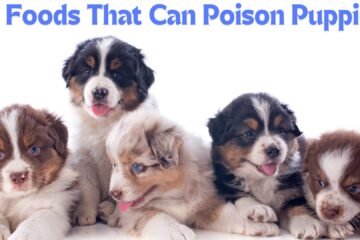Did you know that deer, those majestic creatures often spotted in fields and forests, possess dietary habits that have evolved over millennia to suit their specific needs in the wild?
This raises an intriguing question regarding our interactions with wildlife, especially when it comes to feeding them: Can deer safely consume dry dog food, including premium brands like Ollie?
In a world where human habitats increasingly overlap with those of wildlife, understanding the dietary needs of deer and the potential impacts of feeding them dog food is not just a matter of curiosity but of responsibility.
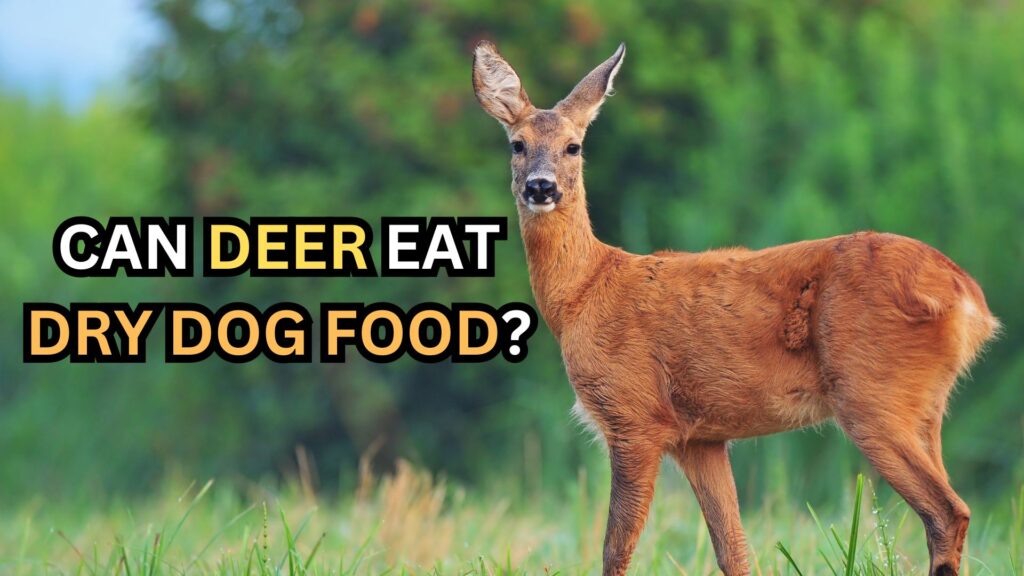
Understanding Deer Dietary Needs
Deer are herbivores, thriving on a diet that primarily consists of leaves, twigs, fruits, and nuts. This natural diet is rich in fiber and is specifically tailored to their digestive systems, which are designed to ferment plant-based food and extract the necessary nutrients efficiently.
The question arises, how does this wild diet compare with domestic pet food like dry dog food, which is formulated for the nutritional needs of carnivorous pets?
Domestic dog food, even high-quality brands like Ollie, is crafted to meet the dietary requirements of domestic dogs, which have a fundamentally different digestive system from deer.
While these foods are high in protein and may contain vegetables and grains to mimic a balanced diet, the concentration of nutrients and the digestibility of the (dry dog) food are engineered for carnivores, not herbivores (like deers).
The Safety of Feeding Dry Dog Food to Deer
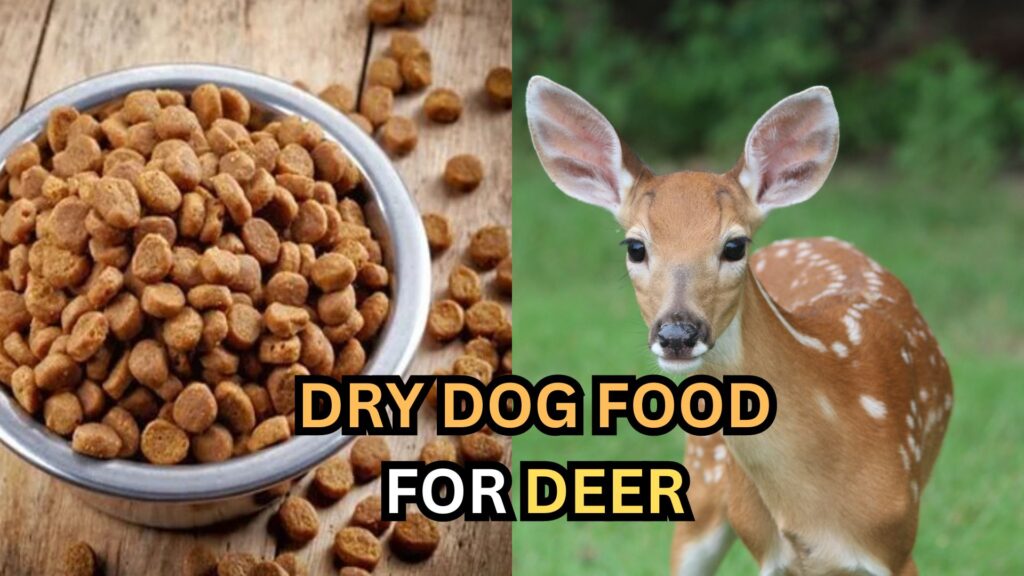
Analyzing the nutritional content of dry dog food, including Ollie, reveals that it is rich in proteins and fats designed to support the health and energy levels of dogs. For deer, however, this nutritional profile can lead to several health issues.
The high protein and fat content, while beneficial for dogs, can cause obesity, malnutrition, and digestive issues in deer, who are not adapted to digest such rich food sources efficiently.
Moreover, the sudden introduction of a highly processed diet can disrupt the delicate balance of their gut flora, leading to further health complications.
Expert opinions from wildlife nutritionists and veterinarians underscore these concerns. Feeding deer with dog food not only risks their health but can also encourage dependency on human-provided foods, disrupting their natural foraging habits and making them more prone to diseases.
The consensus among experts is clear: the safety of feeding dry dog food to deer is highly questionable, and the potential risks far outweigh any perceived benefits.
Ethical and Environmental Considerations
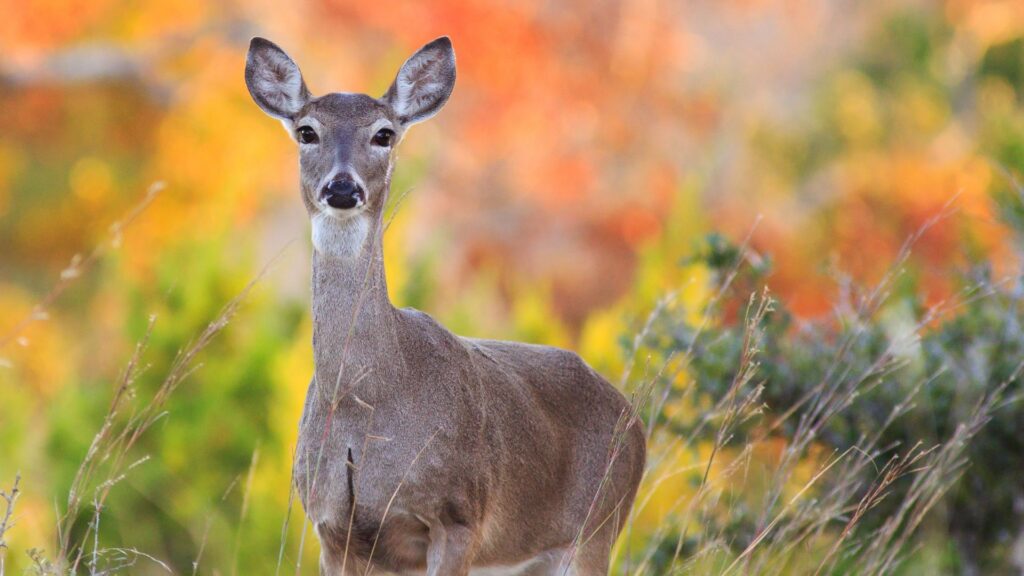
Feeding wildlife, while often done with good intentions, brings forth significant ethical and environmental concerns. One of the primary ethical issues is the potential for dependency that animals, such as deer, can develop on human-provided foods.
This dependency not only disrupts their natural foraging habits but also increases their vulnerability to predators and diseases by habituating them to human presence.
Moreover, feeding deer dog food can lead to unnatural concentrations of wildlife in specific areas, disrupting their natural behaviors and social structures.
The environmental impact of feeding deer on local ecosystems can be profound. Unnatural food sources can lead to overpopulation in certain areas, straining natural resources and leading to ecological imbalances.
This overpopulation can result in the degradation of habitats not only for deer but also for other wildlife species, ultimately reducing biodiversity.
Legal Considerations
Legal considerations also play a crucial role in this issue. Many states in the USA have enacted regulations or guidelines regarding the feeding of wildlife, including deer.
These laws are often designed to protect wildlife health and prevent the negative impacts on ecosystems caused by artificial feeding.
Violating these regulations can result in fines and other penalties, highlighting the seriousness with which this issue is regarded.
Case Studies and Research Findings
Research studies and case studies provide valuable insights into the effects of non-native diets on deer health and behavior.
For instance, research has shown that diets high in carbohydrates and proteins, typical of many dog foods, can lead to an imbalance in the rumen’s microbial ecosystem in deer, causing digestive distress and even death.
Other studies have documented behavioral changes in deer populations that have become accustomed to human-provided foods, including increased aggression and reduced fear of humans, which can have dangerous consequences for both deer and humans.
Real-life case studies, such as incidents where deer populations have been found raiding pet food storage areas, underscore the risks and consequences of feeding deer dog food.
These anecdotes often conclude with wildlife experts emphasizing the importance of maintaining natural dietary practices for deer and other wildlife.
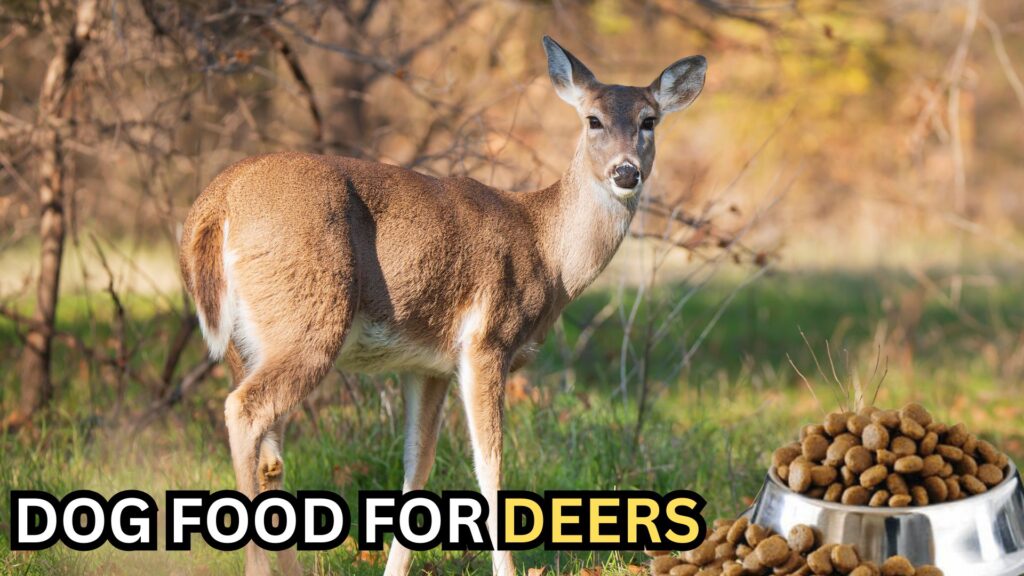
Alternatives to Feeding Deer Dog Food
Recognizing the need to support wildlife in a manner that is both safe and respectful of their natural habits, there are several recommendations for individuals looking to help local deer populations.
One of the most effective ways is to protect and preserve natural habitats, ensuring that deer have access to their natural foods. Planting native vegetation that is beneficial to deer and other local wildlife can provide a more sustainable food source.
For those with pets, it’s crucial to deer-proof dog food storage areas to prevent unintentional feeding. This can include securing trash cans, using enclosed bins for pet food storage, and feeding pets indoors or in areas not accessible to wildlife.
By adopting these practices, individuals can contribute to the health and well-being of deer populations and local ecosystems, fostering a more harmonious coexistence with our wildlife neighbors.
The focus should always be on observing and enjoying wildlife from a distance, ensuring that our actions do not inadvertently harm the animals we appreciate and admire.
FAQs
Can deer safely eat dry dog food?
Deer should not eat dry dog food as it does not align with their natural dietary needs. While deer might physically be able to consume it, the nutritional profile of dog food is inappropriate for them and can lead to health issues.
What are the potential risks of feeding deer with dog food like Ollie?
Feeding deer dog food, including high-quality brands like Ollie, can result in obesity, malnutrition, digestive problems, and an imbalance in their gut microbiome.
Additionally, it can lead to dependency on human-provided food, altering their natural behaviors and increasing human-wildlife conflicts.
How does a deer’s natural diet differ from commercial dog food?
A deer’s natural diet mainly consists of leaves, twigs, fruits, and nuts, which provide the necessary fiber, nutrients, and energy suited to their digestive system.
In contrast, commercial dog food is formulated for carnivores, with a high content of protein and fats, and lacks the high-fiber content deer need for proper digestion.
What are the legal implications of feeding wildlife in residential areas?
Many regions have laws and regulations against feeding wildlife to protect both animals and humans. These can include fines and other penalties for those found feeding wildlife, especially in a manner that endangers the animals’ health or disrupts their natural habits.
Are there any safe alternatives to feeding deer that won’t harm them or disrupt their natural habits?
The safest way to support deer is by preserving their natural habitats and ensuring they have access to natural food sources.
Planting native plants that are beneficial to wildlife and not attracting them with human food are effective strategies.
Always observe wildlife from a distance to avoid unintentional harm.
Conclusion
Throughout this exploration of whether deer can eat dry dog food, including premium brands like Ollie, we’ve uncovered the critical importance of understanding the dietary needs of wildlife and the potential impacts of human intervention.
While the intention behind feeding deer might stem from a place of kindness, the health, ethical, and legal considerations make it clear that this practice can do more harm than good.
Feeding deer dog food can lead to serious health issues for the deer, disrupt their natural behaviors, and have unintended consequences on local ecosystems. It’s essential to respect wildlife by supporting their natural dietary habits and avoiding actions that could lead to dependency or harm.


